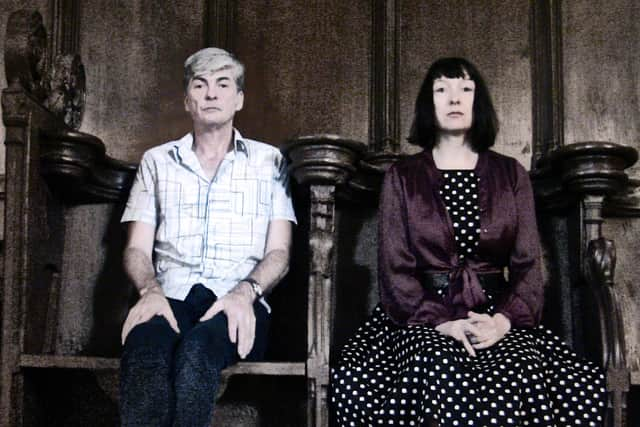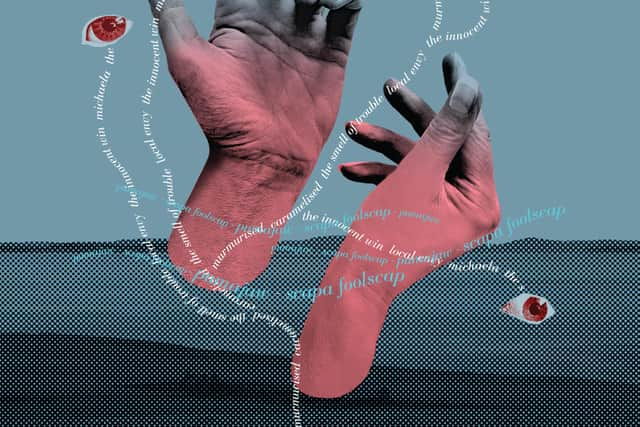Scapa Foolscap: Pumajaw on their new Orkney-inspired album


Pumajaw last prowled round these parts with their album and performance project Song Noir, interpreting music from films in eerie yet seductive fashion. But in 2015, the duo, comprising singer Pinkie Maclure and multi-instrumentalist John Wills, took a break from the group and pursued solo interests. Wills also bowed out of the reunion of his former band, psychedelic rockers Loop, to make his own music, including a soundtrack to the short film Strange Bird, while Maclure concentrated on her work as a stained glass artist – “a slow, technical process,” she says, “whereas music tends to be more of a blood-curdling splurge.”
After a time, Maclure missed the splurge – and noticed a difference in the dynamic of her relationship with Wills. The pair were musical collaborators before they were partners, first meeting in the mid-90s when Wills produced a solo album for Maclure. Until pausing Pumajaw, they lived and worked together, first in London, then in the East Neuk of Fife and Perthshire.
Advertisement
Hide AdAdvertisement
Hide Ad“To stop doing music together had quite a profound effect,” says Maclure. “That was part of the glue that kept us together and for music not to be there anymore felt wrong and strange. It was great to start again having had a break from all that.”


Now living in Tayport, Fife, the couple are scratching their seven-year itch with the release of a new Pumajaw album, Scapa Foolscap, named in honour of its accidental birthplace, Scapa Flow. During their hiatus, Wills studied sound recording with wildlife sound recording specialist Chris Watson, including a field trip to Orkney to record around the natural harbour and divers’ paradise of Scapa Flow and produce a piece for the St Magnus Festival.
“I was all set to move there and then I realised I’d only been there on really sunny days,” says Wills. “It felt like I was abroad. It was quite alien for me because everywhere is really flat so you can see for miles and the skies are massive. When I came back I was really upset that I couldn’t see the horizon. Everything felt quite claustrophobic. I was working with this 3D sound, just trying to get back to that expansive feeling that I got from Orkney.”
Working from home, Wills immersed himself in the new recording techniques he had learned. “I wanted to try and use the idea of all-encompassing sound in the music without swamping it. Rather than trying to think of melodies, I was writing little loops and collaging them together without thinking this is ever going to go anywhere. I was just enjoying myself and then Pinkie was able to make something of it. It became like a game of tennis.”
“When I finally heard bits and bobs, I thought ‘ooh, I quite like this, is it alright if I join in?’” says Maclure. “I quite enjoy singing a freeform melody over a loop or a strange distorted guitar noise because it gives you such freedom to build something up from there.”
The duo worked on and off on the material which would form Scapa Foolscap for six years with no particular agenda in mind. “I don’t think I’ve ever gone into a project before without an endgame,” says Wills, “but I really like that feeling now. Doing stuff outside your comfort zone is quite important for me as well. I like the blind panic! It was more of an escape route during the pandemic. To start off you’re creating your world but all of a sudden we had eight songs and it felt like an album. We had no idea how to even put an album out at that time because everything felt so different and we had lost touch with virtually everyone we knew so we just felt our way through it.”
The results are as mesmerising as anything Pumajaw have produced before. While elements of the backdrop are more abstract, Maclure’s distinctive tone, ranging from a deep, intoning alto to siren flutters, provides cohesion, while lyrical inspiration came from Orkney and well beyond. One highlight is The Mirror of the Other, an incantatory duet with Irish singer/songwriter Adrian Crowley.
Advertisement
Hide AdAdvertisement
Hide Ad“In my mind, I had this idea of people standing on different islands calling out to one another across the sea,” says Maclure, “because it is like that when you are on Orkney, you can see all the different islands. It seemed like a good metaphor for trying to bind together. It was written when Trump had just been elected so the growing division between people was in my mind, and that was a metaphor for trying to look at the world from somebody else’s point of view, reaching out to them.”
The natural world infuses the words as much as the music on opening track Murmurised. “I had noticed that people just love those starling murmurations,” says Maclure, “and those first few weeks of lockdown when the weather was amazing, people who never normally got a chance to be out there in nature were suddenly getting all this joy from it.”
Wills, meanwhile, encouraged others to make their own pandemic field recordings for his Great John Cage Project in Lockdown podcast (“rolls off the tongue,” he deadpans). Inspired by Cage’s legendary “silent” piece 4’33”, he solicited recordings of local environments from around the world. “To start with it was all blackbirds,” he says, “and then there would be political things, including something from Belgrade where everybody clapped for two minutes as we did and then it turned into this massive noise because they were protesting against the government.”
As semi-normality returns (again), Pumajaw have taken heart from completing their comeback album during the pandemic shutdown of live music. “In some ways – not financially, but psychologically – it’s a gift to have all the pressure taken away and suddenly you’re given the time to be creative,” says Maclure. “It may in the long run be beneficial because musicians so often feel under pressure to keep putting out more albums and do more gigs and you can’t always be that productive. And you produce better work if you do it when you feel inspired.”
Scapa Foolscap is released by Bedevil Records on 21 January
A message from the Editor:
Thank you for reading this article. We're more reliant on your support than ever as the shift in consumer habits brought about by coronavirus impacts our advertisers.
If you haven't already, please consider supporting our trusted, fact-checked journalism by taking out a digital subscription at https://www.scotsman.com/subscriptions